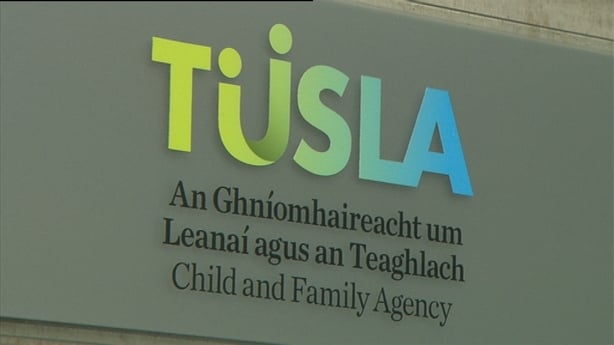There was an increase of almost 10,000 referrals to the Child and Family Agency between 2021 and 2022.
According to Tusla's latest annual report, there were 82,855 referrals to child protection and welfare services in 2022 - a 13% rise on the previous year.
The report - the first to be published under its new CEO Kate Duggan - comes days after the State agency acknowledged that it was in a crisis.
Judge Dermot Simms of the Dublin Metropolitan District - who has since retired - wrote the letter in May, warning of "the risk, or indeed likelihood" that the State would face future claims "arising out of its failure to comply adequately with its duty of care and statutory duty to many of these children".
His letter, which was published by the Child Law Project highlighted the placement of children in "unsuitable" special emergency residential placements, due to a lack of care placements.

Tusla's 2022 annual report shows that by the end of the year, 22,033 cases were open to social work nationally, with 72% (15,920) of these allocated to a social worker; the remaining 28% (6,113) were awaiting allocation.
Of those cases awaiting allocation, 58% (3,537) were 'active’ on a duty system receiving a social work service, according to the report.
It has noted that all children requiring an immediate response were prioritised.
Admissions to care were down 51 (6%) on 2021 (864), while 28 (4%) fewer children went into care for the first time.
In total, there were 5,755 children in the care of the agency at the end of 2022 (108 fewer than in 2021), with 89% of children in foster care.
In his letter, Judge Simms expressed concern over a lack of properly regulated, suitable placements for foster care, residential placements and special care, as well as a shortage of qualified staff at the agency.
Last year, Tusla's fostering recruitment campaign resulted in 182 new Tusla foster carers being approved, with a further 29 going through the process of approval at year end.
However, the annual report has noted that recruitment of sufficient numbers of foster carers remained a significant challenge, and when leavers were considered, there were 75 fewer foster carers than were approved.
Key risks to foster care identified last year included a risk to the safety, welfare and the wellbeing of children due to inadequate capacity, resources or systems to ensure compliance with national standards for safeguarding.
Among the actions taken was finalising "operational guidance" for the management of child protection concerns for children in care.

Unprecedented demand is causing challenges in providing timely responses, particularly in terms of family support services, Tusla's interim CEO Kate Duggan has said.
Speaking on RTÉ's Morning Ireland, Ms Duggan said around 6,000 children are currently waiting to be allocated a social worker but almost 4,000 of these children are being seen by other workers from Tusla.
The unallocated cases are lower priority cases, she said, but ones where families might need support and advice.
Family resource centres or a wide range of community and voluntary services, funded by Tusla, could be providing assistance in these cases, she added.
She said the annual report reflects the breadth of work the agency is doing but acknowledged that there are challenges in providing timely responses.
Special Emergency Arrangements were highlighted by the Child Law Project this week when Judge Simms pointed out that a six-year-old girl was put in this type of "unsuitable (unapproved)" accommodation.
In May, the Ombudsman for Children's Office called for the placement of children in unregulated accommodation to be prohibited when they were before the Joint Oireachtas Committee on Children.
Tusla’s 2022 annual report has acknowledged that a key risk to the agency last year was failing to meet several requirements (care standards, procurement, finance) through the increasing use of Special Emergency Arrangements.
The report has outlined the introduction of an oversight and quality improvement approach which has included local arrangements to provide assurance in terms of the qualification of staff, and garda vetting of staff.
The "approach" also included the appointment of Emergency Care Co-ordinators for Regions and the development of a new Standard Operation Procedure and Governance structure which it said would be in place by October 2022.
Children and young people should have a care plan in place according to the report, as well as an allocated social worker and it has noted the development of a Special Emergency Arrangements tracker for reporting on a weekly basis.
According to the report, there was a risk last year to the "continuity of service delivery" for the cohort of young people who require Special Care Services.
Special Care Services differ from general residential care because they are secure units. Children are not detained as a result of criminal offences, but for their own safety and welfare.
The report has noted a lack of availability of placements in these units last year as a result of a lack of onward placements for young people in Special Care.
Contributing to the current difficulties it said, was the lack of regulation of the Guardian Ad Litem Service and capacity issues.
In an effort to combat the issue, Tusla implemented an Integrated Governance Model to "ensure timely transition from special care".
Turning to residential care, the annual report pointed to Tusla's Strategic Plan for Residential Care Services for Children and Young People 2022-2025.
That plan aims to reverse the agency’s "disproportionate dependency" on private residential care, "incrementally increasing" its public residential capacity by an additional 104 beds - reducing dependency on residential care from the current position of 60:40 private/public, to a ratio of 50:50 public/private by 2025.
Tusla’s Service and Quality Committee focused on Reviewing Residential Care, Foster Care and Aftercare strategic plans last year, and there was "learning from HIQA" inspection reports.
As regards service user experience - the Child and Family Agency is aware that it needs to continue to build trust and this is stated by Ms Duggan at the top of the report.
In the body of the document, Tusla has acknowledged that there remained a risk of reduced public confidence in the agency due to adverse findings from statutory investigations, inspections and serious incidents.
Remaining factors, according to the Child and Family Agency, are consistency within practice and legacy issues.







